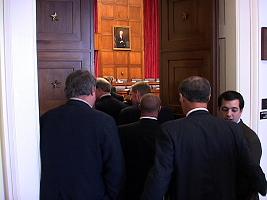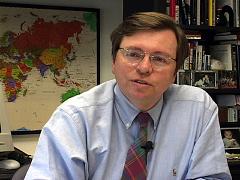

The consolidation of power within large media corporations is a huge potential problem that many people are clueless about. The reasons behind it may be for increased synergy, cost savings, or, as Orwell Rolls in His Grave posits, for increased power and the ability to control the dissemination of information. This documentary sheds light on a subject largely ignored by the media (gee, how odd) but taints its own message by taking a non-partisan view and making it highly liberal (granted, a pretty easy thing to do, especially these days), the overuse of title cards and ominous music, and by choosing to focus on certain interview subjects that give really good sound bytes, but lack substance and even come off as slightly paranoid.
Media consolidation is fraught with issues. The Walt Disney Company owns a number of cable stations and the ABC Television network. GE owns NBC, and recently merged with Universal and Vivendi. Rupert Murdoch's Newscorp owns FOX, Foxnews, and a large number of newspapers. Will ABC be willing to report on corporate problems in Disney? Or will NBC be willing to report a scandal at GE? If so, will they do so with as much impartiality as their competitors? The public is now faced with companies owning multiple television channels in the same market, or, like in Los Angeles, where Tribune, the company that owns the Los Angeles Times also owns a local television station. While stations may proliferate, the number of owners is shrinking. Will this bring forth a diversity of opinion? It certainly hasn't in radio. Radio giant Clear Channel now owns multiple stations in many large markets, and the results has been that every radio station now sounds the same.
This is by far the most interesting subject, but comes last. Instead, director Robert Kane Pappas (Some Fish Can Fly, Now I Know) brings viewers through what almost seems like a litany of complaints against the Bush administration. It doesn't help that he has footage of Michael Moore acting like, well, Moore, and that some of the topics he addresses have already been addressed better in Fahrenheit 9/11. Moreover, Moore was able to get better interviewees. Pappas sticks primarily to professors and ex-journalists. The only person worth listening to is Charles Lewis, founder of the Center for Public Integrity. Instead, he has people like Prof. Robert Chesney and author and Prof. Mark Crispin Miller, who are smart people but come across as having their own agenda.
Pappas takes the viewer through the Florida election debacle, the Iran hostage crisis, the governments involvement with flying bin Laden family members out of the country after 9/11, all the while tying in how large companies are using the news to tell what they want people to hear. These companies siphon out news that is bad to them, or harmful to their goals. Makes sense. What doesn't work is Pappas slipping into first person, and even appearing on camera briefly in the beginning. The graphics, either shots of definitions or white text on a black screen become repetitive. The real challenge will be for Pappas to get word out about his documentary. Since this is a small film, wide distribution and sales are not likely. And will stations and papers owned by large conglomerates advertise or talk about a movie that criticizes them?